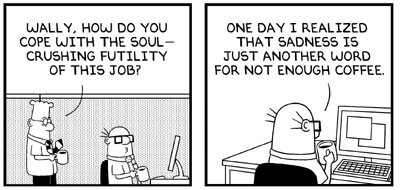I arrived at my work building yesterday at 8:30 AM. Nobody from the firm mentioned that the building would be locked on Saturdays, however, and that a special key is required to gain entry. Luckily for me, someone from a different business located in the same building came to work a few minutes later, and let me into the building.
Nobody from the firm mentioned that the same special key would then also be required to operate the elevator or unlock doors in the fire escape. AKA I was stuck in the lobby of this building for a short while. Eventually a desk attendant of some kind was able to assist me, and I met my new supervisor in the elevator on my way up to the office.
My new supervisor, not the same person who runs the firm and who hired me, was born in the 1920s to the best of my knowledge. He has an office assistant who performs all of his letter-writing needs. Thus, it's the three of us who sit in one medium-sized office to do our work.
My supervisor says to me, "Don't trust anyone!" Sure... then he says "If you have a question, ask ME and don't talk to anyone else!" Well then... "You're allowed to make two kinds of mistakes when you work for me.. do you know what they are?" I replied "no," that I have no idea. He says "None, and none whatsoever." Finally he says, "you have to be perfect when you work for me, or really close to it."
It would seem these are the terms of my employment, and yet I like them. My new supervisor keeps things orderly, maintains meticulous records, and gets every job done efficiently. What's more, he encourages me to ask questions. Because I'm learning the ropes of this brand new "tax world," I'm more than welcome to interrupt him any time I like to ask questions. From what I've heard from other CPAs, accountants in general don't like to be bothered. I'd heard that older accountants especially are very reluctant to take time out of their busy schedule to teach younger employees new things. My supervisor, on the other hand, is the exact opposite, and I love it!
I want to learn as much as I can about the business I'm working in, and I think that things are going to work out very well between my supervisor and I.
I began the day by having a snack. Yesterday was the first Saturday of Tax Season that all personnel are expected to work. From now until April 15th, I and every other accountant at the firm will be in on Saturdays. Accordingly, each member of the team has signed up for a Saturday that they will bring breakfast for everyone else to snack on in the morning. So I ate a croissant.
Then I was given the task of printing off some "Pro Forma" forms using a computer system. These were basically blank tax forms that my supervisor and I would use to write in information about clients. I began to sort through a client's tax documents, and as I found important numbers, I would input them onto these blank Pro Formas. Afterward, my supervisor went through my Pro Formas line-by-line to ensure that I'd put things in the correct place, and to correct me where I hadn't. Although I didn't get this far, the final step will be to type these hand-written numbers into the computer's tax program, so that the return can then be compiled.
One might think that this is a simple process, but there are over 250 schedules and other IRS forms that can potentially be worked through, and some clients have incredibly sticky tax situations. When people work a job, own a business, have a trust, IRA, inheritance, etc, and live in a foreign country... holy boboli things can get messy really quick. It's not as easy as just punching numbers into the computer, either. As accountants, we have to look into how certain figures are contrived, to ensure that neither we nor the client are breaking the law.
I've found that we tend to be conservative in the tax world, for example we may be slow to include certain deductions on a Schedule A because of one reason or another. At the same time, though, if a client provides us with information that they assure us is factual, even though they do not submit supporting documents to verify the situation, we simply go with what the client wants. Naturally, however, the client is informed in writing that they must be able to provide proof of every figure quoted on their entire return to the IRS, should they be audited.
As the day moved along, my supervisor had to leave the office, and his letter-writing assistant left too. I was left to do research and reading. I spent some time trying to memorize tax forms, so that in the future I don't have to look very long for the place where a number goes. I also read the firm's "Quality Control Assurance" manual. That was interesting and provided some guidance on how to do my job, and the professional expectations that the workplace carries. Lastly, I ran through some tutorials on the computer to familiarize myself with the tax software that the company uses.
All-in-all, I wasn't too thrilled to be working on a Saturday.. but I'll get used to it soon enough, for I know that getting used to working 6 days per week during financial statement seasons, or tax season, will be a must for when I begin working in the accounting business full time.
I also tried the coffee in the office's kitchen for the first time.. french vanilla. Yum.




